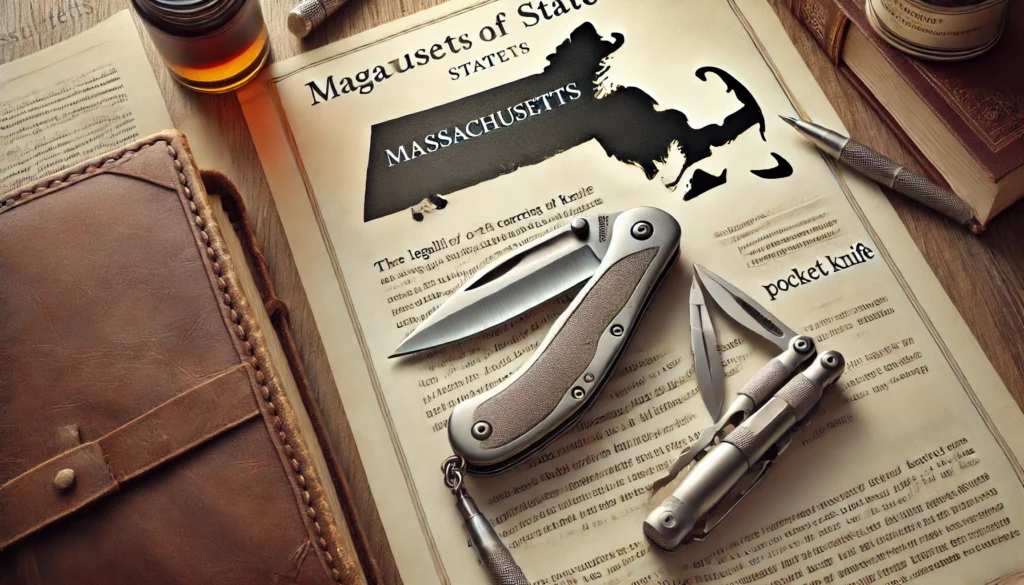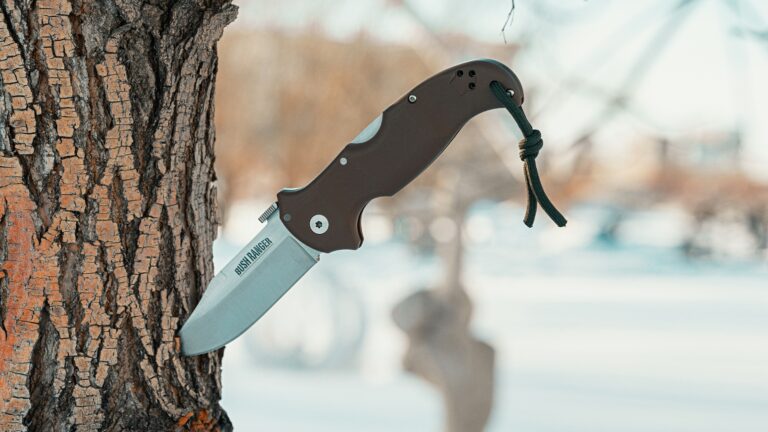
Massachusetts laws regarding the legality of carrying a knife can be specific and sometimes confusing. If you’re wondering, Is it legal to carry a knife in Massachusetts?—whether you’re a knife enthusiast, a traveler, or someone who needs a tool for practical purposes—it’s essential to understand the regulations governing knife possession and carry in the state. This article will examine Massachusetts’s legalities, restrictions, and guidelines for carrying knives.
Is it legal to carry a knife in Massachusetts? (Short Answer)
Carrying certain types of knives in Massachusetts is legal, but there are restrictions. For instance, double-edged knives, switchblades, and automatic knives are often prohibited. However, you can carry folding knives and multi-tools for everyday purposes. However, it’s important to note that local laws vary, and you should always check specific city regulations. Use common sense and avoid carrying knives in restricted areas like schools and government buildings.
Understanding the Basics
General Knife Laws
Massachusetts law classifies knives into different categories based on their characteristics. The most common types of knives include:
- Folding Knives include pocket knives and other folding blades typically used for everyday tasks.
- Fixed Blade Knives: These are non-folding knives, such as hunting or kitchen knives.
- Automatic Knives: Also known as switchblades, these knives have a spring-loaded blade that deploys automatically.
- Ballistic Knives: These knives can use a spring mechanism to project the blade out of the handle.
The legality of carrying these knives often depends on their design and intended use.
Legal Restrictions
Prohibited Knives
Massachusetts law explicitly prohibits possessing and carrying certain types of knives in public. According to Massachusetts General Laws Chapter 269, Section 10, it is illegal to carry:
- Switchblades:
Automatic knives with blades that open by pressing a button.
- Ballistic Knives:
Knives that can project the blade from the handle.
- Daggers and Dirks:
Double-edged knives designed for stabbing.
- Stilettos:
Thin, pointed knives intended for thrusting.
Possessing any of these prohibited knives, whether concealed or openly carried, can result in criminal charges.
Schools and Government Buildings
It’s important to note that carrying knives on school grounds or in government buildings is strictly forbidden. This includes both primary and secondary schools, colleges, and universities. Violating this rule can lead to severe penalties, including arrest and prosecution.
Blade Length
While Massachusetts law does not specify a maximum blade length for folding or fixed-blade knives, local ordinances may impose additional restrictions. It’s crucial to check the specific regulations in the city or town where you plan to carry the knife.
Exceptions and Permissible Carry
Legitimate Reasons
Carrying a knife for legitimate purposes is generally allowed under Massachusetts law. Legitimate reasons can include:
- Employment:
Occupations like construction, culinary arts, and outdoor activities may require carrying knives.
- Hunting and Fishing:
Knives for hunting, fishing, and related outdoor activities are typically permissible.
- Collection:
Knife collectors may possess and carry knives as part of their collection if they adhere to state laws and local ordinances.
Concealed Carry
Massachusetts law does not explicitly address the concealed carry of legal knives. However, carrying a concealed knife intended to be used as a weapon can be considered illegal. It’s advisable to carry knives openly and in a way that does not raise suspicion.
Practical Advice for Knife Enthusiasts and Travelers
- Be Informed
Before carrying a knife in Massachusetts, familiarize yourself with state laws and local ordinances. Ignorance of the law is not a valid defence, so it’s essential to be well-informed.
- Secure Your Knife
Keep knives securely stored when transporting them, especially in vehicles. Use a sheath or case to prevent accidental injury and demonstrate responsible ownership of fixed-blade knives.
- Avoid High-Risk Areas
Clear about carrying knives in prohibited places, such as schools, government buildings, and specific public events. Always check the rules and regulations of particular venues if you need clarification.
- Respect Law Enforcement
If approached by law enforcement while carrying a knife, remain calm and cooperative. Clearly explain the knife’s purpose and show you know about the legalities. Respectful behaviour can go a long way in avoiding misunderstandings.
Conclusion:
Understanding the legalities surrounding knife possession and carry in Massachusetts is crucial for enthusiasts, travellers, and anyone who relies on knives for practical purposes. While Massachusetts law has specific restrictions, being informed and responsible can help you navigate these regulations effectively. Always stay updated on state laws and local ordinances, and when in doubt, seek legal advice to ensure compliance. By adhering to the guidelines outlined in this article, you can enjoy your knives while staying within the legal boundaries, ensuring both your safety and the safety of others. Feel free to share your experiences or ask questions in the comments below. Stay safe and informed!
FAQs
Yes, you can carry a pocket knife in Massachusetts. However, it is always wise to check local laws in your city for additional restrictions.
No, switchblades are illegal to carry in Massachusetts. The law prohibits carrying automatic knives that open by pressing a button or similar mechanism.
Knives like ballistic knives, double-edged daggers, dirks, and stilettos are illegal to carry in Massachusetts. Carrying these can result in criminal charges.
Yes, you can carry a knife for work purposes such as construction or culinary jobs. Just make sure the knife you have is not one of the restricted types.
The state law does not specify a maximum blade length for folding or fixed-blade knives, but some cities may have their own rules. Always check the local ordinances where you plan to carry the knife.
Massachusetts prohibits carrying switchblades, ballistic knives, daggers, and stilettos. You cannot have any knives on school grounds or in government buildings. Always check local ordinances for specific restrictions in your area.
Tourists can carry a knife in the USA but must follow local and state laws. Different areas have different rules about what types of knives are allowed. Always check the regulations in the places you plan to visit.
In Massachusetts, you can legally carry pepper spray, some types of stun guns, and certain types of knives. Always check local rules for specific limits. Carrying other weapons, like firearms, usually requires a permit.
No, carrying a sword in public is generally illegal in Massachusetts. Swords are considered dangerous weapons and are subject to strict regulations. Always verify local laws before carrying any blade.






